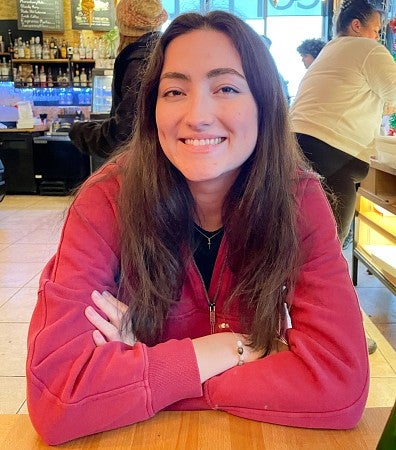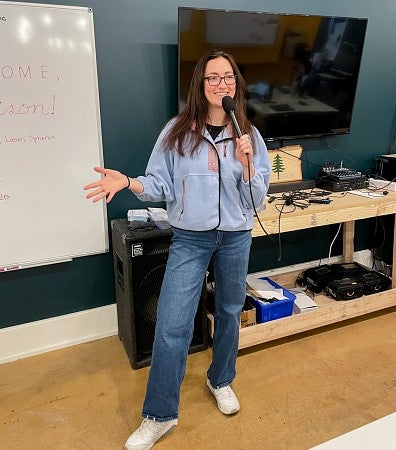As a grad student in the Advertising and Brand Responsibility Master’s program, Eva Camacho is exploring the importance of branding for successful women-owned businesses.
Chad Shelton interviewed Eva Camacho, a grad student in the SOJC’s Advertising and Brand Responsibility Master’s program. This article is part of a series highlighting graduating students from the SOJC. It has been edited for length.

1. Why did you choose the Advertising and Brand Responsibility Master’s program?
I believe that as a community, we have a responsibility to look out for the good of those around us, and this program spoke to my desire to make an impact. This degree is a comprehensive crash course in everything that makes for effective advertising, teaching you to think critically and creatively about ideas, both big and small. The UO School of Journalism and Communication (SOJC) offers innovative educational opportunities. It provides the only advertising program with an emphasis on brand responsibility that I’m aware of.
Furthermore, as someone who works full-time in communications at a nonprofit, it was important to me to participate in a program that met my needs as a working professional. While it hasn’t been easy, I’ve been lucky to feel supported by countless faculty and staff along the way.
2. What do you enjoy most about being an advertising master’s student?
I’ve enjoyed the friends and connections I’ve made within my cohort. We’re all figuring it out together and cheering each other on along the way, which has been a lot of fun. It is also gratifying to gain new perspectives, collaborate on projects and develop new skills in classes.
I’m currently working on my terminal capstone project titled “Women on Brand.” Going into this project, I was curious about the importance of branding for small, women-owned or -led businesses and found that there was not much research into that intersection. That’s when I decided to interview local women who own businesses as well as branding and industry experts on the importance of branding for the success of small, women-owned businesses. I’m documenting what I find on the Instagram account @womenonbrand. It has been such a joy to speak with so many different women about their experiences, learning about the positive elements and the challenges.

3. What’s been your favorite class at the SOJC?
I’ve loved all of the classes I’ve taken so far, but I especially loved Curiosity for Strategists with Slavka Eberhart-Garah. I started out skeptical, because how do you quantify curiosity? However, it quickly became one of my favorite classes due to its exploratory nature. In this class, we learned to think visually by using mood boards, Post-it Notes, whiteboards and drawings to conceptualize ideas and work through problems. We also learned how to implement the design thinking framework, a valuable tool for strategists. It emphasizes research, identifying problems and being creative with solutions. Design thinking also operates under a circular, nonlinear system, highlighting how you can and should always revisit different stages in the process.
We also learned about interpersonal communication strategies, such as “thinking hats” and “nonviolent communication,” which proved particularly helpful in real-world situations. Throughout the term, we worked on team assignments, and I had the pleasure of collaborating with my team on our project “DRAG,” focused on LGBTQIA+ workplace advocacy.
4. How do you think your graduate degree will help you achieve your goals?
When I began the master's program in advertising and brand responsibility, I didn’t have a clear vision of what I wanted to do in the future. As the year went on, this program has helped me identify that I see myself working in brand strategy. Throughout this program, I’ve learned how to identify and articulate goals for myself and campaigns as well as how to be adaptive and think strategically and creatively when problems arise.
Working on my terminal project, “Women on Brand,” has helped me discover that I’m passionate about strategic storytelling and amplifying women’s voices. All of my readers, Dr. Chris Chávez (Carolyn Silva Chambers Distinguished Professor of Advertising), Dr. Sally Lim (assistant professor of advertising and brand responsibility) and Slavka Eberhart-Garah (pro tem instructor) have encouraged me to follow that passion and embrace both strategy and creativity. As someone with an undergraduate degree in public relations who always saw myself as analytical but not creative, this program has helped me find and identify that creativity.
5. What advice would you give someone curious about getting a graduate degree?
It’s essential to take your time and explore what you’re passionate about, then find a program that best suits your needs. Also, and most importantly, it’s OK to do it scared, and it’s OK to ask for help. Grad school can feel intimidating, but everyone feels the impostor syndrome. If you are dedicated to it, you can make it happen. Lean on the faculty, professors and your classmates to find support. Ask lots of questions!
Chad Shelton is the social media strategist for the SOJC and creator of Ridgeline Magazine.
